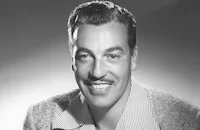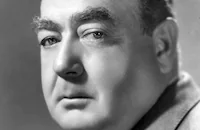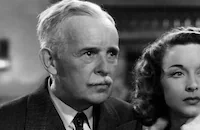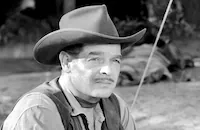Wife, Husband and Friend

Brief Synopsis
Cast & Crew
Gregory Ratoff
Loretta Young
Warner Baxter
Binnie Barnes
Cesar Romero
George Barbier
Film Details
Technical Specs

Synopsis
The opening of the opera season in New York City is no time for rejoicing in the life of building contractor Leonard Borland. Each year, his wife Doris instantly becomes smitten with the singing bug, a weakness the women in her family are cursed with, according to her father, Major Blair. Upon arriving home one day, Leonard finds Doris exercising her vocal cords under the tutelage of voice teacher Hugo and her overbearing mother. Leonard, taking the bull by the horns, throws both Hugo and his mother-in-law out. Despite this, Doris prepares for a recital that is coming up three months, something Leonard comes to support, believing such a performance will get singing "out of her system." At the last moment, Doris learns that music critic Rudolph Hertz has been given the wrong date for her recital. The dutiful Leonard visits Hertz at a luncheon, and when the critic refuses to attend the recital, Leonard blasts the critic for ignoring his wife. Opera diva Cecil Carver witnesses Leonard's act of love and becomes instantly smitten. Doris' recital is a huge success, due in large part to Leonard's filling the hall with friends and business associates. While Leonard's business suffers under the strain of a recession, Doris continues her spendthrift ways, planning for a major singing career. Cecil calls Leonard and invites him to her apartment to advise him on Doris' career. At their meeting, Cecil tells Leonard that his wife has not a bad voice, but not a good one, either. A telegram arrives informing Cecil that she must perform a song she does not know. Discovering that Leonard knows the song, Cecil convinces him help her learn it. Leonard warns her about his voice and proceeds to shatter a glass. Cecil instantly recognizes that Leonard, not Doris, has the great opera voice and offers to train him. At first Leonard refuses, but Cecil convinces him by playing on his insecurity of being a "boy-made-good who married the society girl." By being a great singer, Cecil tells him, Leonard will finally be on Doris' social level. While Doris' singing career flounders, Leonard's career as "Logan Bennett" meets with great success on a tour of Eastern cities with Cecil. After returning to New York in preparation for a national tour, Leonard finds Doris in bed under doctor's care having been booed off the stage in her professional debut as the opening act at a movie theater. That night, at her mother's party to celebrate her "great success," Doris is confronted by Cecil. Leonard claims innocence to adultery and tells all, but no one believes him until he performs "On the Road to Mandalay." Doris runs from the party and throws Leonard out of their apartment, after which Leonard goes on a week-long drunk, spending what little money he has left, until he is found by Cecil. Back in Cecil's clutches, Leonard is forced to perform the lead in an opera. On opening night, Leonard makes a fool of himself, much to the delight of everyone but Doris. Backstage, Doris goes to Leonard, telling him that she loves him now more than ever. Leonard's business partner, Mike Craig, arrives, and informs him they have a job building a million-dollar racetrack in Florida. On the train to Florida, Leonard and Doris break into a rendition of "Beyond the Blue Horizon." When Mrs. Craig joins in, Mike playfully stuffs a pillow in her mouth.

Director

Gregory Ratoff
Cast

Loretta Young

Warner Baxter

Binnie Barnes

Cesar Romero

George Barbier

J. Edward Bromberg

Eugene Pallette

Helen Westley
Ruth Terry
Alice Armand
Iva Stewart
Dorothy Dearing
Helen Ericson
Kay Griffith
Harry Rosenthal
Edward Cooper
Renie Riano

Lawrence Grant
Charles Williams

Howard Hickman

George Irving
Harry Hayden
Robert Kellard
Helen Brown

Fern Emmett
Mary Lou Dix
Julie Carter
Ruth Clifford
Ludovico Tomarchio
Lowden Adams
Cecil Weston
Zeni Vatori
Thomas Carr
Dave Morris
Gwendolen Logan
Tudor Williams

Robert Lowery
Arthur Rankin
Leo Mostovoy
Crew
Dave Anderson
Don Anderson
Charles Armstrong
Jason Bernie
W. T. Brent
Walter Bullock
David Buttolph
T. Chavrova
Lucille D'antoine
Emery Darcy
Richard Day
Antonín Dvorák
Edward Ebele
Count Phil De Esco
W. D. Flick
Bud Gaunt
George Gittens
Milt Gold
Charles Graham
W. Franke Harling
Armando Hauser
Roger Heman
Nunnally Johnson
Nunnally Johnson
Buddy King
Rudyard Kipling
Mark-lee Kirk
Carol Knutson
William Koenig
Nina Koshetz
Thomas Little
Natalie Macfarren
Robert Mack
Howard Mccann
Bob Mclaughlin
Ben Nye
Carrie O'neil
Pat Palamountain
Ernest Palmer
William Pillar
Orin S. Pinney
Samuel Pokrass
Leo Robin
Ernest Rotchy
Royer
Lester Scharff
William Sittel
Oley Speaks
Fred Spencer
Rose Steinberg
Walter Thompson
Henry Weinberger
Walter Whaley
Richard Whiting
Darryl F. Zanuck

Film Details
Technical Specs

Articles
Wife, Husband and Friend
Encouraged by her voice coach (Cesar Romero, looking very much the scheming Latin lover) and her harpy of a haughty, snobbish mother (Helen Westley, all arrogance and disdain), Doris decides to revive the singing career she put on hold to marry Leonard. Musical ambition is apparently a trait of the Boland women: "a vicious streak of music runs through the whole caboodle of them," Doris' father (George Barbier) warns Leonard. It's apparently a fate that has already driven him to drink, but Leonard dismisses the warning signs until it's too late to do anything but play along and hope she'll just get over it. While Doris goes into full career mode, professional opera and recital singer Cecil Carver (Binnie Barnes) discovers that self-described bathroom-singer Leonard is a born baritone and a natural talent. Hoping to woo this frustrated gent from his distracted wife, Cecil makes him a proposal: she'll secretly coach him so he can beat his wife at her own game. Secrets and lies inevitably pile up (this couple is not a paragon of communication, but then where would the story come from if they actually were honest with one another?) and their fairy-tale marriage becomes a battle of the sexes. Until the inevitable happy ending, that is, which offers the strangest kind of moral: There's nothing like failure and humiliation to heal a marriage.
Warner Baxter wasn't known as a light comedian but he acquits himself well as the street-smart lug turned successful businessman. He's as cultured as a bum at the ball and looks like a thug in a tuxedo when he delivers his first recital, slouching and scratching himself while serenading an audience of swells with the voice of an angel. Offstage he's a typical thirties chauvinist and is downright condescending to his wife's dreams, but his direct manner and snappy wit is a refreshing breeze through the stultifying air of snooty, condescending social manners and upper-class arrogance. Loretta Young, a Hollywood class act of dignity and elegance, plays Doris as the embodiment of the dreamy society woman who runs on pure emotion and impulse, and essentially plays straight-man to Baxter's practical manner. (The role was, reportedly, originally to be played by Myrna Loy, perhaps in hopes to recreate the magic she had created opposite William Powell.) They are an unlikely couple but the affection they exhibit for one another is palpable and makes the romance work.
The terrific Binnie Barnes made a career of tough-minded dames and other woman roles and is in excellent form here as Cecil, working her seductive smile and bedroom eyes on Leonard, who is nervous at best and oblivious at worst, much to her consternation. One feels the mighty power of the production code in the way that director Gregory Ratoff (who directed Ingrid Bergman in her American debut in Intermezzo the same year) and screenwriter/producer Nunnally Johnson (who adapted James M. Cain's short story "Two Can Sing") effectively scrub most suggestions of infidelity out of the film. Romero, whom one expects to make a pass at his star pupil, is left to largely skulk through the background of Wife, Husband and Friend.
Running a brisk 75 minutes, the lightweight comedy is a silly little distraction with charming moments. Gravel-voiced character actor Eugene Pallette makes the most of his brief role with his trademark delivery of sardonic quips and little-known Ruth Terry brings a kind of Judy Garland innocence to her turn as Leonard's secretary. The score features a mix of opera selections and concert hall pieces with popular standards, notably a rendition of "On The Road to Mandalay" that Leonard delivers at a high society party. (Warner Baxter, Loretta Young and Binnie Barnes all lip-synch their musical performances, of course, but the real singers are not identified in the credits.)
Wife, Husband and Friend is one of the last films that Loretta Young made under contract to 20th-Century-Fox. When her contract was up, the actress declined to be re-sign for Fox or any other studio, which would put her at the mercy of the studio bosses. Many predicted that her career would flounder as the studios snubbed her services, but after a lean year she was back in major productions and subsequently won an Oscar® for the 1947 The Farmer's Wife.
Producer: Nunnally Johnson
Director: Gregory Ratoff
Screenplay: Nunnally Johnson (based on the novel Two Can Sing by James M. Cain)
Cinematography: Ernest Palmer
Art Direction: Richard Day, Mark-Lee Kirk
Costume Design: Royer
Set Decoration: Thomas Little
Cast: Loretta Young (Doris Borland), Warner Baxter (Leonard Borland), Binnie Barnes (Cecil Carver), Cesar Romero (Hugo), George Barbier (Maj. Blair), Eugene Pallette (Mike Craig).
BW-75m.
by Sean Axmaker

Wife, Husband and Friend
Quotes
Trivia
Notes
The working titles for this film were Women Are Dangerous and Career in C Major. According to information in the Twentieth Century-Fox Records of the Legal Department at the UCLA Theater Arts Library, Ernest Pascal and Edwin Blum wrote a treatment and screenplay based on the story before April 1937, but Nunnally Johnson's work was based on the original story rather than the Pascal-Blum treatment and screenplay. Hollywood Reporter reported in August 1937 that Myrna Loy was borrowed from M-G-M to co-star with Warner Baxter in this film, though her role was eventually played by Loretta Young. According to information in the Twentieth Century-Fox Produced Scripts Collection, also at UCLA, Lionel Atwill was considered for the part of Hertz, Ed Brophy for the part of Jaffe, Charles Lane for the part of the hotel manager, and Eily Malyon for the part of Mrs. Craig. According to a Twentieth Century-Fox press release, Vladimir Bakaltinoff, the conductor for the film, once conducted at the Imperial Opera in Old Russia. The property man for the film, Count Phil de Esco, was the only titled property man in Hollywood. The story was performed by the Lux Radio Theatre on April 28, 1941 starring George Brent, Pricilla Lane and Gail Patrick. Modern sources state that writer Cain was paid eight thousand dollars by Twentieth Century-Fox for the film rights to this story. Nunnally Johnson filmed the story once again for Twentieth Century-Fox Film in 1949 as Everybody Does It, starring Paul Douglas and Linda Darnell.














